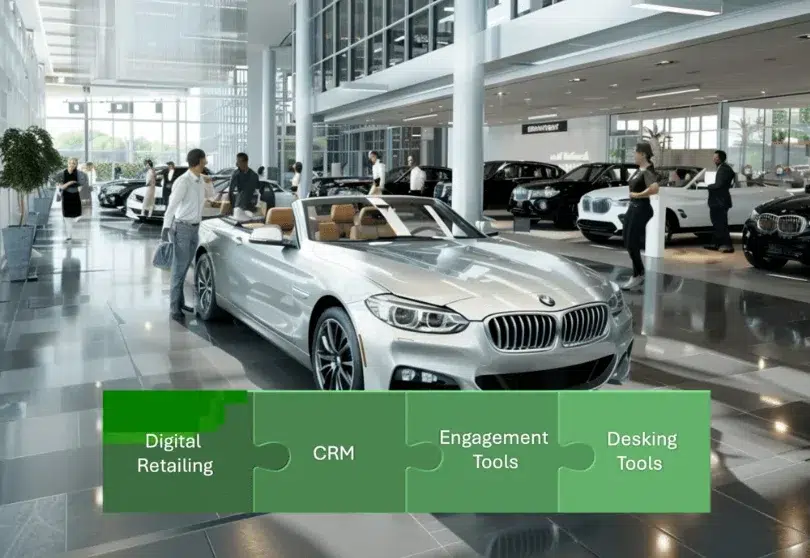Dealer Tools: Keys to Your Dealership’s Success

Running a successful dealership isn’t just about selling cars—it’s about doing it faster, more efficiently, and more profitably than your competitors. Most dealerships already have the right tools in place—a CRM to track leads, a digital retailing platform to capture online buyers, desking software to structure deals, and inventory management tools to stock the right vehicles. You probably even have communication tools and service scheduling platforms to keep customers engaged long after the sale.
But here’s the real question: Are these dealership tools actually helping your dealership sell more cars?
This isn’t a “you need more tools” conversation. This is about getting more out of the tools you already have. We’re diving into how to use them better—how to close the gaps, fix the disconnects, and maximize the car dealer tools you’re already paying for.
In this article
- 1 Car Dealership Tools That Directly Boost Sales Performance
- 2 Dealership Tools that Enhance Customer Engagement
- 3 Dealership Tools for Optimizing Inventory
- 4 How to Choose the Right Dealership Tools
- 5 Getting the Most Out of the Tools You Already Have
Car Dealership Tools That Directly Boost Sales Performance
The right technology should do more than just support your sales team—it should actively help them close more deals, faster. But having the tools in place isn’t enough. How well they’re used, integrated, and optimized makes all the difference.
CRM: Your Secret Weapon or a Lead Graveyard?
Your CRM is more than a database—it’s a sales enablement engine designed to help your team engage with leads, keep deals moving, and eliminate missed opportunities. But if your CRM isn’t being fully utilized, it can quickly turn into a digital filing cabinet—holding names but driving little action.
Salespeople often see CRMs as extra work, not as tools that help them work smarter. When follow-ups lack automation, they’re inconsistent, and when managers check usage, they frequently find incomplete or outdated data. These gaps don’t just slow operations—they hurt customer trust. Today’s buyers expect more. According to a recent Automotive CX Study, 74% of car buyers say personalized experiences influence their next purchase. If your CRM isn’t helping your team deliver tailored, timely follow-ups, you’re losing high-intent buyers before they even reach your showroom.
The good news? You don’t need more tools—you need better processes. With the right approach, your CRM can be transformed from a static database into a dynamic, deal-closing asset that works for your dealership every day.
To make your CRM work harder, focus on its ability to automate tasks, surface actionable insights, and seamlessly integrate with your other tools. Here’s how you can close the gaps and use your CRM to win more deals:
How to Close the Gaps & Use it To Win
✅ Automate Smart Follow-Ups: Set up personalized text and email sequences triggered by customer actions. A generic “just checking in” won’t cut it—target follow-ups based on lead behavior, whether they requested financing info, browsed a specific model, or submitted a trade-in estimate.
✅ Make CRM Activity a Non-Negotiable: Leads, follow-ups, and customer interactions must be logged, every time. Managers should review CRM activity daily—not just to check compliance, but to spot missed opportunities before they become lost deals.
✅ Turn CRM Data into a Sales Advantage: Train your team to use CRM insights beyond basic contact storage. Before every customer interaction—whether online, by phone, or in-person—salespeople should check past inquiries. This ensures they pick up where the customer left off, instead of treating them like a cold lead.
✅ Sync CRM with Every Sales Tool: Your CRM should talk to your digital retailing, desking, and marketing tools in real-time. If customer details aren’t carrying over automatically, you’re adding unnecessary friction that slows deals down.
Tip: Great dealerships don’t just store customer data—they act on it. Set a rule: No lead should sit more than 24 hours without a follow-up.
Profit Checker: How many deals could your team close if every lead received personalized attention at the right time?
Digital Retailing: A Seamless Experience… or a Messy Disconnect?
Digital retailing tools are redefining how customers interact with dealerships, offering buyers the convenience of starting their car purchase journey online. Ideally, these tools should function as a seamless extension of your showroom, allowing customers to build deals, value trade-ins, and explore financing options from the comfort of their home. But too often, the experience feels disjointed, frustrating buyers and creating inefficiencies for your team.
Where the disconnect happens: Customers frequently start their journey online, only to walk into the dealership and feel like they’re starting over. Sales teams often don’t have access to—or fail to use—the information collected during the digital retailing process. Trade-in values or payment options shown online may differ from what’s presented in-store, eroding customer trust and creating friction. And for high-intent buyers who want a smooth transition, these breakdowns can mean the difference between closing a deal and losing a sale.
The opportunity: The rise of online shopping has made convenience and transparency non-negotiable for today’s buyers. A well-integrated digital retailing strategy builds momentum and trust. By ensuring that online actions—whether it’s a trade-in evaluation, payment estimate, or credit application — carry over seamlessly in-store, you can create a frictionless experience that keeps buyers engaged and confident in their decision. Done right, digital retailing doesn’t just support your sales process—it accelerates it.
To turn your digital retailing tools into a competitive advantage, focus on integration, consistency, and responsiveness. Here’s how to close the gaps and create a seamless customer experience.
How to Close the Gaps & Use it To Win
✅ Make Online Deal Building Seamless: Customers expect real, lender-backed payment options online, not generic estimates. Ensure that the financing terms they see online are consistent with what they’re presented in-store. Any discrepancies erode trust and can derail the deal..
✅ Sync Digital Retailing with Trade-In Tools: Trade-in values calculated online should automatically populate in your in-store system without adjustments or re-entry. Surprises at the desk lead to frustration and unnecessary negotiation hurdles..
✅ Treat Digital Leads Like Walk-Ins: High-intent customers who submit credit applications, browse specific models, or request financing info online should receive the same priority as showroom visitors. Set up alerts for your team to respond to these digital leads with urgency and personalization.
✅ Turn Browsers Into Buyers: Before a customer walks through the door, your team should already know their preferences, from vehicle choices to payment terms, and whether they’ve submitted a trade-in or credit application. Equip your sales team to pick up where the customer left off online, rather than making them feel like a cold walk-in.
Tip: Use Digital Retailing to Upsell Protection Plans. Customers who see F&I options while structuring their deal online are more likely to buy them in-store..
Profit Checker: Does your digital retailing platform integrate in real-time with your CRM, desking, and trade-in tools? If not, how many deals are you losing due to process disconnects and frictions?
Desking: Speed Kills (In A Good Way)
Desking is where deals take shape and momentum builds. A fast, seamless desking process ensures that customers see real, fundable numbers quickly—keeping them engaged and confident in their buying decisions. But when outdated workflows or manual reworks slow the process, deals lose momentum. Every delay is an opportunity for customers to second-guess their decisions, shop competitors, or simply walk away.
This isn’t just about saving time; it’s about creating trust. When your desking process consistently delivers accurate payment options in seconds, customers feel reassured that your dealership is organized, efficient, and focused on meeting their needs. On the other hand, manual processes, disconnected systems, and approval bottlenecks can erode that trust, weaken gross margins, and increase walkouts.
Why this matters now: In a competitive market, buyers have more options than ever. If your dealership isn’t delivering speed and transparency during the desking process, you’re at risk of losing to competitors who can. But with the right tools and workflows, desking can become a strategic advantage that builds trust, accelerates deals, and strengthens profitability.
A winning desking strategy is about more than speed—it’s about precision, control, and integration. Here’s how you can optimize your desking process to keep deals moving forward.
How to Close the Gaps & Use it To Win
✅ Innovate Your Desking Strategy: New pre-desking innovations can provide fundable payment options and finance scenarios at the point-of sale – online or in-store.
✅ Make Every Deal Structure Take Less Than 2 Minutes: If your managers are manually adjusting numbers for every deal and every deal adjustment, you’re wasting time. Your desking solutions should handle it instantly.
✅ Present Multiple Payment Options Upfront: Don’t force customers to ask. Show them real, lease, finance, and cash options immediately to eliminate the trust gaps and reduce the back-and-forth.
✅ Sync Desking with Your Digital Retailing & CRM: If a customer starts structuring a deal online, that data should automatically flow into your in-store desking tools
Tip: Speed matters, but so does accuracy. Fast desking means nothing if the numbers are wrong. Ensure your pre-desking tool pulls real-time lender approved finance scenarios to avoid costly reworks and lost trust.
Profit Checker: How many more deals could you close if every payment quote was qualified, fundable, and ready in seconds?
Dealership Tools that Enhance Customer Engagement
Customer engagement tools bridge the gap between interest and action, keeping buyers engaged and service customers returning. But when response times lag, scheduling is difficult, or systems don’t sync, frustration replaces trust. Missed chats, manual follow-ups, and disconnected tools slow deals and push customers elsewhere.
In today’s 24/7/365 marketplace, speed and convenience win so if your tools aren’t keeping customers moving forward, you are losing business.
Communication Tools: Building Trust or Losing Buyers?
Your dealership’s communication tools should make it easier than ever for customers to engage, ask questions, and move closer to a purchase—anytime, day or night. But too often, slow responses, poorly trained staff, and disconnected systems turn quick conversations into lost opportunities.
Live chat inquiries sit unanswered, chatbots frustrate instead of helping, and sales teams fail to recognize high-intent buyers—treating digital leads like cold walk-ins. Worse yet, these conversations aren’t properly logged or integrated into your CRM, forcing customers to repeat themselves and causing friction when transitioning from online to in-store. And what happens after business hours? Your website is open 24/7, but if your communication tools aren’t, you’re missing opportunities.
If your team isn’t treating digital conversations with the same urgency as showroom walk-ins, your dealership is leaving deals on the table.
How to Close the Gaps & Use it To Win
✅ Respond to Leads in Real Time: Treat online and chat inquiries with the same urgency as a showroom walk-in. Set response-time benchmarks (e.g., under 60 seconds for live chat, under 5 minutes for text inquiries) to ensure engagement before customers lose interest.
✅ Use Video to Personalize Conversations: Customers don’t always want to come into the dealership right away. Use video tools for vehicle walkarounds, answer finance questions, or walk them through deal structures. A personalized approach builds trust and moves them closer to buying.
✅ Automate Smart Responses, But Keep It Human: Chatbots can handle basic FAQs, but real conversations require real people. Use AI-driven responses to engage customers instantly, then transition them to a live team member for a natural sales interaction.
✅ Adapt to Buyer Preferences: Some customers prefer texting over calling, others want a quick video chat, and some need follow-ups via email. Train your team to recognize and respond to preferred communication styles to improve engagement and boost closing ratios.
Tip: Customers who get quick, personalized responses are more likely to visit your dealership. If you’re slow to engage, your competitor is just one message away. Help your customers buy the car.
Profit Checker: Is your dealership’s virtual showroom truly open 24/7/365, or are you missing opportunities when customers need you most?
Service Scheduling: A Hassle-Free Experience or a Customer Turnoff?
Your sales team works hard to win customers—but your service department determines whether they stay. A smooth, convenient service scheduling process keeps customers engaged, builds trust, and increases the chances they’ll buy their next car from you.
But too often, the experience is frustrating, outdated or inconvenient. Customers struggle to book online, wait too long on hold, or don’t get confirmations after scheduling. If after-hours booking isn’t an option, they may postpone service—or worse, schedule with a competitor who makes it easier. Every gap in your service scheduling process is an open door for customers to leave—and not come back.
How to Close the Gaps & Use it To Win
✅ Offer 24/7 Online Scheduling: Your service department may close at 6 PM, but customers book appointments on their own time. Ensure they can schedule anytime—day or night—without needing to call.
✅ Make the Booking Process Mobile-Friendly: If customers can’t book an appointment in under two minutes on their phone, your system is too complicated. Remove unnecessary steps, auto-fill customer information, and show real-time availability clearly.
✅ Automate Confirmations & Reminders: Reduce no-shows by sending automatic appointment confirmations, reminders, and rescheduling options via text or email. After service, follow up with a satisfaction survey and an invitation to book their next visit.
✅ Integrate Service History & Maintenance Alerts: A returning customer should never have to guess what their car needs. Ensure your system displays past service records and upcoming recommended maintenance so customers can book the right service with confidence.
Tip: A returning service customer is 2x more likely to buy their next car from you. Make service seamless, and you’re not just keeping a customer—you’re securing a future sale.
Profit Checker: Does your service scheduler automatically update your CRM and follow up with customers, or is your team doing it manually?
Dealership Tools for Optimizing Inventory
Inventory isn’t just what’s on your lot—it’s how fast you move it, how well you price it, and how effectively you manage allocation, trade-ins, and aged units.
A well-optimized inventory strategy keeps high-demand cars turning, prevents discount-driven losses, and ensures trade-ins feed your used car pipeline. But when systems don’t sync, pricing falls behind the market, trade-in values create friction, and aging units erode gross. Winning dealers don’t just manage inventory—they maximize every unit’s profit potential.
Inventory Management Solutions: You Can’t Sell What You Don’t Have
Your inventory is your dealership’s biggest investment, and how well you manage it directly impacts profitability. The right inventory management platform should help you move the right cars faster, minimize aging losses, and ensure real-time availability across all sales channels.
But too often, breakdowns in the system lead to costly mistakes. Vehicles sit unnoticed until they become aged inventory problems, pricing isn’t adjusted to match market demand, and disconnected systems create frustrating experiences where customers inquire about vehicles that aren’t actually available. If your inventory data isn’t accurate, real-time, and actionable, you’re losing sales, eroding gross, and making decisions in the dark.
How to Close the Gaps & Use it To Win
✅ Automate Aging Inventory Alerts: Set price adjustments and action plans at 30, 45, and 60 days to prevent profit loss before it happens.
✅ Sync Inventory Across All Platforms in Real Time: Ensure your website, CRM, and third-party listings instantly reflect availability, pricing, and updates to avoid customer frustration.
✅ Use Market-Based Pricing to Protect Gross: Adjust prices dynamically based on real-time demand, competitor pricing, and market trends—so you’re never overpricing or undervaluing units.
✅ Integrate Acquisition & Reconditioning Data: The moment a vehicle is acquired, it should auto-populate in your system for reconditioning tracking, pricing evaluation, and retail availability—no delays, no manual re-entry.
Tip: A car that isn’t fully merchandised isn’t fully for sale. Move vehicles faster by ensuring pricing, merchandising, and market adjustments happen within 24 hours of arrival.
Profit Checker: How many units are sitting longer than 45 days simply because they weren’t priced or merchandised correctly from day one?
Trade In Tools: Deal Accelerator or Deal Killer?
For many customers, their trade-in is the single biggest factor in deciding whether to move forward with a purchase. A seamless, transparent trade-in process builds trust, speeds up negotiations, and keeps buyers engaged.
But too often, dealerships fumble the trade-in experience. Online values don’t match in-store offers, creating frustration and deal hesitation. Customers feel lowballed or confused by vague explanations. Worse, if the trade-in process takes too long, buyers have time to second-guess the deal or shop competitors.
The result? Lost trust, longer negotiations, and customers walking before the deal is done. If your trade-in tools aren’t delivering real-time, market-driven offers that seamlessly transition into the deal structure, you’re leaving money on the table.
How to Close the Gaps & Use It to Win
✅ Ensure Trade-In Values Are Consistent Online & In-Store: If a customer gets an instant trade-in value online, they should see the same range when they walk in. Any major discrepancy creates mistrust and slows down the deal.
✅ Integrate Trade-In Tools with Desking & Digital Retailing: A customer’s trade-in value should flow directly into the deal structure—no re-entry, no manual adjustments, no friction.
✅ Use Market-Driven Appraisals to Justify Your Offer: Leverage real-time market data to show customers how their trade value was calculated. Transparency builds confidence and reduces objections.
✅ Speed Up the Process—Keep Them Engaged: If your appraisal process takes too long, customers will start shopping around. Set a target: Trade-in evaluations should be completed in 10 minutes or less.
Tip: Most trade-in customers are already emotionally attached to their next car—don’t give them time to rethink the deal. Keep the process fast and fair.
Profit Checker: How much profit are you losing by letting aged inventory sit instead of aggressively acquiring high-demand trade-ins?
How to Choose the Right Dealership Tools
Your dealership tools should make selling cars easier, faster, and more profitable. But when your tools don’t integrate properly, are difficult to use, or lack vendor support, they slow you down instead of speeding you up.
The right tools should work as one connected system, be easy for your team to adopt, and come with a vendor that supports your success long after the contract is signed. Here’s how to ensure your tech stack is helping—not hurting—your dealership’s performance.
Integration and Compatibility: Your Tools Should Work as One System
Your dealership runs on multiple platforms—CRM, DMS, F&I Platforms, etc and multiple digital retailing tools including credit applications, trade-in tools and service schedulers. If they don’t work together, your team ends up manually re-entering data, chasing missing information, and dealing with pricing mismatches between online and in-store experiences.
- Test before you buy: Don’t assume “it integrates.” Ask vendors for a live demo showing how data moves between their system and your existing tools. If they can’t prove it, reconsider.
- Ensure seamless data flow: Don’t assume it syncs in real time.Test the process by having a team member submit an online lead, then track how that information appears in your system. If details are missing or need to be re-entered, there’s a disconnect that needs fixing.
- Choose future-proof tech: Look for platforms with open APIs that allow integration with future tools as your dealership grows.
Profit Checker: “How much time will this tool save your team every day?” If the vendor can’t quantify time savings, it may not be the efficiency booster they claim.
Ease of Use and Scalability: If It’s Hard to Use, It Won’t Get Used
Even the most advanced software is useless if your team finds it too complicated or time-consuming. If a system slows them down, they’ll find ways to work around it—leading to inefficiencies and missed opportunities.
- Involve your team in decisions: Before making an investment, have your sales, F&I, and service teams test the system. If they struggle in the demo, they’ll avoid embracing it.
- Prioritize simplicity: If a tool requires weeks of training, adoption will suffer. The best software should feel familiar and easy to use within days, not months.
- Plan for growth: Your technology should be able to handle a 30% increase in sales volume without creating bottlenecks. If it can’t, you’ll outgrow it quickly.
Profit Checker: What happens when you need more users, locations, or integrations? Hidden scalability costs can turn a great deal today into a costly mistake later.
Vendor Support and Ongoing Improvements: Choose a Partner, Not Just a Provider
The signed contract isn’t the finish line—it’s the starting point. A vendor should be a long-term partner, providing reliable support, continuous improvements, and a commitment to helping your dealership succeed.
- Check real-world response times: Every vendor claims to have “24/7 support,” but how quickly do they actually resolve issues? Talk to other dealers to get honest feedback.
- Look for continuous updates: Technology moves fast. If a vendor hasn’t made meaningful updates in years,they’re not keeping up with dealership needs.
- Engage with your peer group: The best vendors listen to dealer feedback and refine their software over time. If other dealers are frustrated, you probably will be too.
Profit Checker: “What happens when something breaks?” Ask the vendor for real response times on support issues. A slow fix during peak hours could cost you deals while you wait.
Getting the Most Out of the Tools You Already Have
In an era of rising customer expectations and increased competition, dealership tools aren’t just about efficiency—they’re about creating a seamless, satisfying experience for both your team and your customers. Whether it’s a CRM that drives personalized follow-ups, a digital retailing platform that bridges online and in-store experiences, or desking software that keeps deals moving quickly, these tools have the power to transform your dealership’s performance.
The best performing dealers maximize the dealership tools they already have, streamline processes, and deliver experiences that keep customers coming back. With the right focus on integration, training, and optimization, your dealership can stay competitive, profitable, and ready to meet the demands of today’s buyers.
Get more tips on using technology in your dealership by reading our post on dealership marketing strategies.



